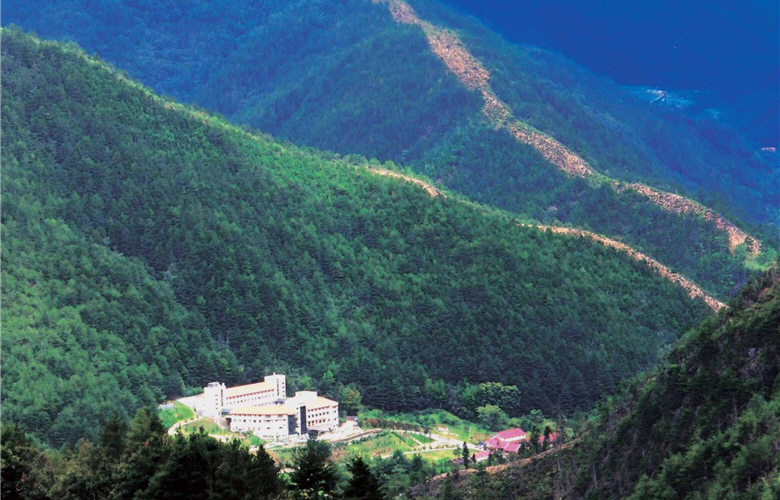
A hand-drawn owl on the windshield of his compact car, a frank and hearty smile, and an unrestrained composure, these are the trademarks of Ching-yao Chiu,an active senior interpreter at Shei-Pa National Park (SPNP). Also known by his nickname “Big Bro Chiu,” he is reputed as “the philosopher in the forest.”
Chiu always has a unique way of thinking toward things in the Nature, and excels at explaining complicated phenomena in ecosystems by real-life examples and his simple style of interpretation. All this is attributed to the tough experiences in his early life, when he had to learn to live with limited resources with his father, who failed as a businessman and started a life as a miner in a remote town.
As little as a graduate from primary school, Chiu once had a full-time job in the day while frequently working overtime and moonlighting when off work, with an average of 17 hours of working hours a day. He even once worked 120 extra hours in 2 weeks! It was made possible “by the basic instinct to survive that shared by all life forms,” Chiu shrugged off his endurance with this awful hardship.
Chiu brought up in the interview a case that exemplifies this tenacity of life: In the Namib Desert in southern Africa lives a certain kind of beetle, which painstakingly climbs to the crest of sand dunes every day, and stands upside-down on its forelimbs while sticking out his abdomen high. It does so only to absorb every possible bit of vapor that hardly exists in the sea wind blowing from the South Atlantic Ocean, in order to collect the resources for its survival.
Every living thing would fight to survive, and thus develop mechanisms and philosophies to deal with the Nature. This experience of living is what humans and other life forms have in common. This observation has contributed to Chiu’s plain but heartfelt style of interpretation about the Nature, one that is truly inspiring and valuable to the listeners.
Whenever asked about the reason he wanted to be an interpreter in the national park, Chiu always proudly joked with his trademark laughter: “I just felt that it’s really cool wearing that vest of an interpreter!”
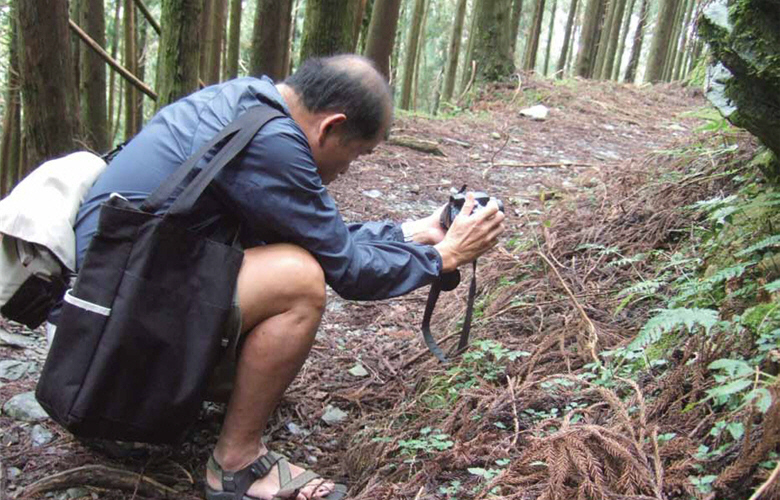
Interview & Text/Zih-yin Chen
Photo Provided by/Ching-yao Chiu
Translator/Kuan-yu Ou
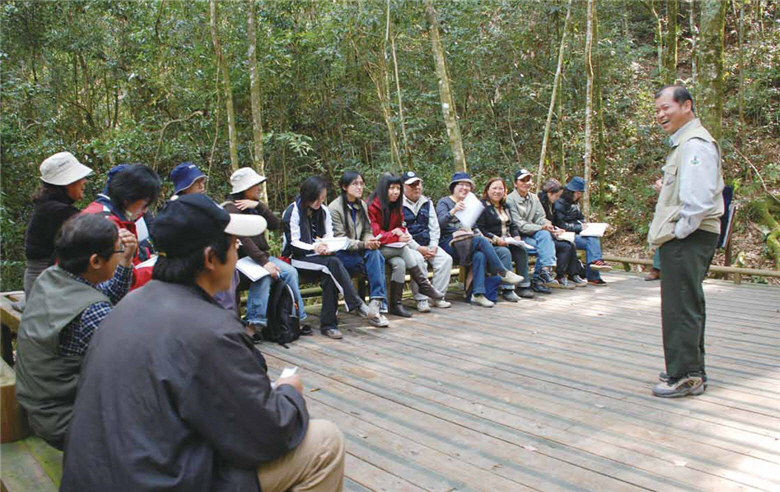
After over 20 years as a career man, Chiu plunged into another sphere:the Nature, as his economic burden has been gradually relieved. In 1991 he joined Taipei Association of Nature Education, and Wild Bird Society of Keelung, and also became a volunteer interpreter for soil and water conservation. In 1993 when SPNP recruited volunteer interpreters for the first time, Chiu, with only an elementary school diploma, didn’t stand a good chance in competition with those with impressive résumés. Fortunately his enthusiasm carried him through the recruitment process as well as the following 18 years of volunteer work.
Besides the cool-looking vest, what's more important to an interpreter is his or her professional knowledge, which had cost Chiu a great deal. “The tuition I’ve been paying is my hair!” he quipped. But the things he learned from books have been kept forever under his scalp.
A visit to Chiu's study gives one a feel of this great pressure posed by the need of professionalism for an interpreter. He is always absorbed and buried in shelves and heaps of books all over the room. He is not afraid of learning things from scratch and is always ready to face challenges. In his philosophy, when making any decision, one should worry about not the known,upcoming difficulties but unexpected ones; and should always be prepared for the former, and be courageous enough to confront the latter.
Life as an interpreter has opened for Chiu another window to a new world and deeper appreciation of the precious Nature, the latter of which he found many Taiwanese lack. Most of them really know how to enjoy and appreciate only arts and dramas rather than the Nature. In light of this, Chiu decided to capture through his camera the beauty of the natural environment to promote people’s appreciation of it.
Chiu used to shoot his subjects without any thoughts or stories to tell. After he became an interpreter and now a professional-like amateur photographer, he began to converse with the Nature through his photos, in each of which he focuses on quality, spirit and ideas, and most importantly, stories about the ecology and the Nature.
During his 20 years of observation about the Nature, Chiu has realized that life forms would inevitably rely on the environment, which has its capacity limit. Animals only prey when hungry but never hunt for fun when satiated and waste the resources. This is how they respect and preserve the environment which their survival counts on.
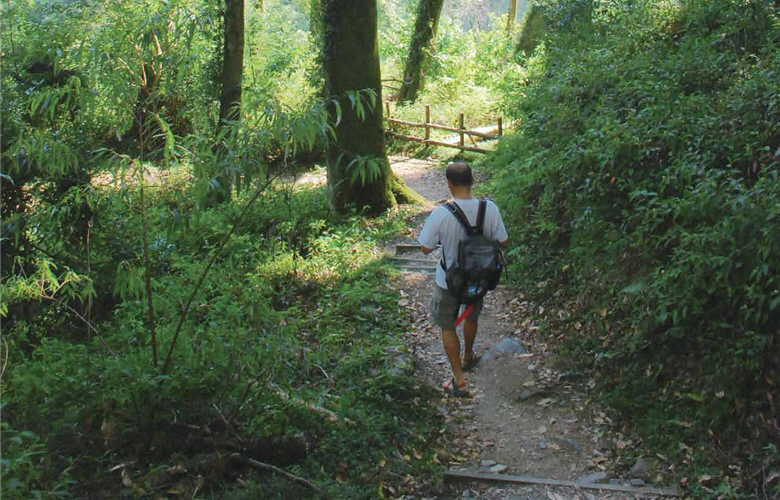
By contrast, humans, through a long process of evolution, have learned to store resources for later use but at the same time started to waste what they have. For example, many would take or order more food than they really need when dining out, waste water by always taking baths rather than showers, or eye more on the oil deposits in the Arctic than on its melting icebergs……
These exploitations have led to a collapsing ecosystem, which is facing an increasingly grave challenge against its capacity. And humans will be among the victims of such a dire future. The recent declining birthrate, Chiu pointed out, has indicated the law of Nature that when resources are unevenly distributed, humans, among all creatures, instinctively stop reproduction of new lives until a balanced ecosystem is restored.
Humans' confidence in “conquering the Nature” is just conceited self-assertion that ignores the insignificance of humans in the face of the Nature’s merciless revenge. In Chiu’s mind, the right attitude people should hold is to “conform to the Nature rather than conquer it.”
As a volunteer interpreter, Chiu has viewed protecting natural resources as his calling. He would dissuade whomever hoses the roads without a sensible reason from doing it, and he sees discarding a paper towel without fully utilizing it as a waste. From interpreting for tourists in the national park to carrying his own utensils and handkerchiefs for each meal, Chiu consistently shows his respect and love for the Nature, and many people around him have been moved and influenced by his persistence.
How long haven’t you used a sun-dried handkerchief? Maybe it’s time for all of us to join the rank and love the Nature as Chiu does. Let’s pay our tribute to this unique volunteer by being an ecofriendly citizen of the Earth!

Since 1991 Chiu has joined Taipei Association of Nature Education (now Taiwan Association of Nature Education), and Wild Bird Society of Keelung, and has also become a volunteer interpreter for soil and water conservation. He has been a volunteer interpreter at Shei-Pa National Park since 1993. Chiu takes delight in sharing correct concepts about ecological education and health, and has fully dedicated himself to promoting environmental protection.
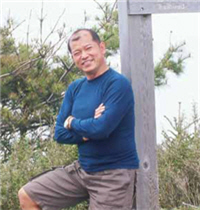


![Text size [Small]](/media/system/images/font_small.jpg)
![Text size [Medium]](/media/system/images/font_normal.jpg)
![Text size [Large]](/media/system/images/font_big.jpg)





